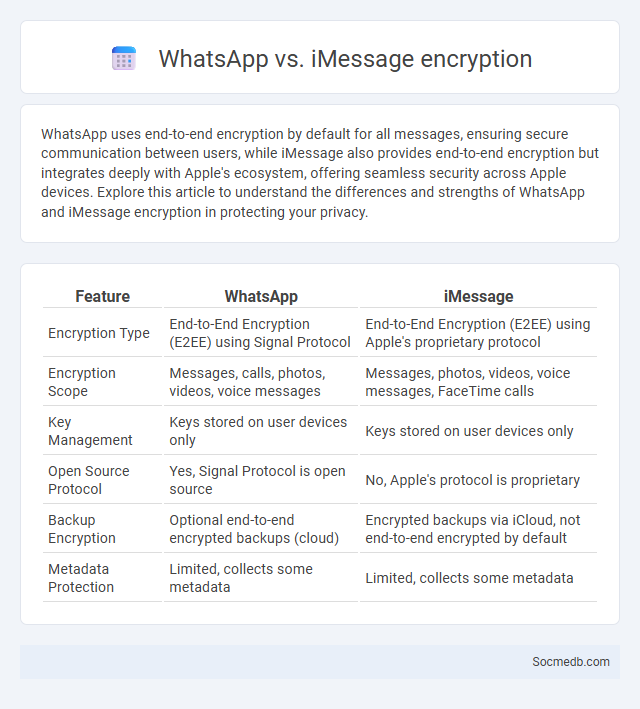
Photo illustration: WhatsApp vs iMessage encryption
WhatsApp uses end-to-end encryption by default for all messages, ensuring secure communication between users, while iMessage also provides end-to-end encryption but integrates deeply with Apple's ecosystem, offering seamless security across Apple devices. Explore this article to understand the differences and strengths of WhatsApp and iMessage encryption in protecting your privacy.
Table of Comparison
| Feature | iMessage | |
|---|---|---|
| Encryption Type | End-to-End Encryption (E2EE) using Signal Protocol | End-to-End Encryption (E2EE) using Apple's proprietary protocol |
| Encryption Scope | Messages, calls, photos, videos, voice messages | Messages, photos, videos, voice messages, FaceTime calls |
| Key Management | Keys stored on user devices only | Keys stored on user devices only |
| Open Source Protocol | Yes, Signal Protocol is open source | No, Apple's protocol is proprietary |
| Backup Encryption | Optional end-to-end encrypted backups (cloud) | Encrypted backups via iCloud, not end-to-end encrypted by default |
| Metadata Protection | Limited, collects some metadata | Limited, collects some metadata |
Introduction to Messaging App Encryption
Messaging app encryption secures your private conversations by converting messages into coded formats that only intended recipients can decode. This end-to-end encryption technology prevents unauthorized access, ensuring that neither hackers nor platform providers can read your texts, voice calls, or shared media. By prioritizing encryption, your digital communication remains confidential and protected from surveillance.
What is End-to-End Encryption?
End-to-end encryption (E2EE) secures messages by encrypting data on the sender's device and decrypting it only on the recipient's device, preventing intermediaries from accessing the content. Social media platforms like WhatsApp and Signal use E2EE to protect user privacy and prevent unauthorized access or surveillance. This encryption method ensures that only participants in the communication can read the messages, enhancing security against hackers and service providers.
WhatsApp Encryption: How It Works
WhatsApp uses end-to-end encryption to secure messages, ensuring only the sender and recipient can read the content. This encryption employs the Signal Protocol, generating unique security keys stored exclusively on users' devices, preventing interception by third parties. All messages, calls, photos, and videos are protected by this system, maintaining user privacy across the platform.
iMessage Encryption: An Overview
iMessage encryption uses end-to-end encryption to protect messages between Apple devices, ensuring only the sender and recipient can read the content. This security is based on public key cryptography, where each device possesses a unique key pair for encrypting and decrypting messages. Apple's continuous updates enhance iMessage encryption protocols, reinforcing user privacy within the iOS ecosystem.
Key Differences Between WhatsApp and iMessage Encryption
WhatsApp employs end-to-end encryption by default using the Signal Protocol, ensuring that only the sender and recipient can read messages, with encrypted backups available optionally. iMessage also uses end-to-end encryption but integrates deeply with Apple's ecosystem, offering seamless encryption for texts, media, and FaceTime calls, while storing encrypted data in iCloud with user-controlled keys. Unlike WhatsApp's cross-platform functionality, iMessage is limited to Apple devices, impacting accessibility but benefiting from Apple's hardware-based security features.
Data Protection: WhatsApp vs iMessage
WhatsApp employs end-to-end encryption by default for all messages and calls, ensuring that only participants can access the content, while iMessage also uses end-to-end encryption but integrates directly with Apple's secure ecosystem, including device-level encryption and stringent privacy policies. WhatsApp collects metadata such as contact information and usage patterns, which could be accessed by Facebook for business purposes, whereas iMessage limits data collection and stores message keys on Apple devices to enhance user privacy. Both platforms offer robust security features, but iMessage provides tighter integration with Apple's hardware and software security, making it a preferred choice for users prioritizing comprehensive data protection.
Metadata Handling in WhatsApp and iMessage
WhatsApp and iMessage manage metadata differently, impacting your privacy and data security. WhatsApp collects and stores metadata such as timestamps, contact information, and message status on its servers, which can be accessed by law enforcement under certain conditions. iMessage encrypts metadata more rigorously, keeping message timestamps and sender information primarily on user devices, enhancing confidentiality and minimizing data exposure.
Encryption Vulnerabilities and Potential Risks
Encryption vulnerabilities in social media platforms expose user data to unauthorized access, increasing the risk of privacy breaches and identity theft. Weak or outdated encryption protocols can be exploited by hackers to intercept messages, alter content, or launch man-in-the-middle attacks. These security flaws compromise the confidentiality and integrity of sensitive information shared across social media networks, posing significant threats to both individual users and organizations.
User Privacy and Third-Party Access
User privacy on social media platforms is safeguarded through strict data encryption and access controls to prevent unauthorized third-party data breaches. Platforms implement transparent privacy policies allowing You to manage permissions and control the sharing of personal information with external applications. Robust user authentication systems and continuous monitoring reduce the risk of third-party access to sensitive social media data.
Which Messaging App Offers Better Security?
Signal offers superior security features with end-to-end encryption enabled by default for all messages and calls, ensuring user privacy. WhatsApp also provides strong encryption protocols but is owned by Meta, which raises concerns over data collection and metadata sharing. Telegram offers optional encryption via secret chats but lacks default end-to-end encryption, making Signal the preferred choice for users prioritizing maximum security.
 socmedb.com
socmedb.com